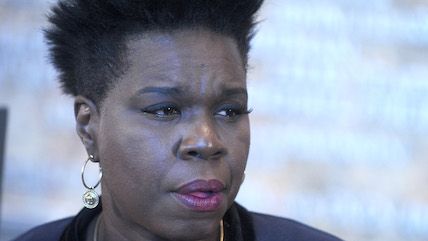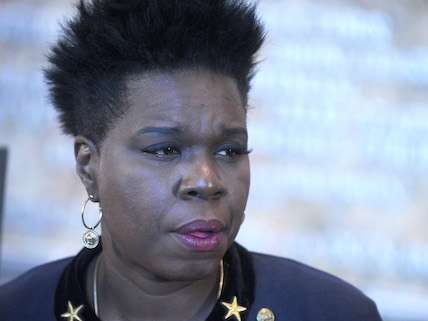On Leslie Jones vs. Milo Yiannopoulos: Supporting Free Speech Does Not Mean Endorsing Nazism
There's anti-political correctness, and then there's harassment.


This should go without saying, but in case it isn't clear: one can and should support the free speech rights of Nazis—without actually converting to Nazism.
Sometimes this line is blurry, like when college libertarian groups bring controversial speakers to campus—Milo Yiannopoulos, for instance—with the explicit goal of violating a college's speech-chilling norms and policies. But sometimes this line is less blurry, like when a pack of ardent racists send vile and threatening messages to a black actress because they perceive her to be an enemy in the battle between the alt-right and the social justice warriors.
This is what happened to Leslie Jones, breakout star of the new Ghostbusters movie. (Confused? Read Kurt Loder's review of the movie and overview of the controversy here.) Yiannopoulos gave the movie a negative review, got into a fight about it with Jones, and then the Twitter trolls descended, subjecting her to all manners of abuse.
Yiannopoulos shouldn't be on the hook for other people's bad behavior—he says he didn't spur the trolls to take action—but was nevertheless banned from Twitter after CEO Jack Dorsey talked to Jones.
Spiked's Brendan O'Neill—no fan of the anti-speech left—gets it right in a recent column that staunchly rejects the treatment of Jones:
The comments made about Ms Jones have been genuinely nauseating. She has been called the N-word. She has been sent photographs of apes. It's like something from the 19th century. No one who believes in racial equality and basic human decency could fail to be moved by her pained tweet following two days of relentless racial slurs: 'I feel like I'm in personal hell. I didn't do anything to deserve this. It's just too much. It shouldn't be like this. So hurt right now.' For any black person to be subjected to racist abuse is horrific; for it to happen to a woman whose only 'crime' was to land a breakthrough role in a female-oriented summer blockbuster is particularly despicable. Ms Jones hits the big time and is instantly bombarded with racist smears — awful.
These attacks on Ms Jones speak to something more than the raucousness of Twitter, which can often be a good thing, certainly to the extent that it allows unheard, eccentric and potty voices to be heard. It speaks, more importantly, to the derailment of the important task of challenging PC. Tragically, for those of who us want to prick PC from a genuinely liberal and pro-autonomy perspective, the anti-PC mantle has in recent months been co-opted by the new right, or the alt-right, as some call them. These lovers of Trump (they call him 'daddy') and conspiracy theorists about feminism (whose wicked influence they spy everywhere) have turned being anti-PC from a decent, progressive position into an infantile, pathological, Tourette's-style desire to scream offensive words out loud, like the seven-year-old who's just discovered the thrill that comes with saying 'f**k'.
It's one thing to say that awful, racist, evil people deserve the same free speech rights as everyone else. It's quite another to actually engage in awful, racist, and evil behavior.
The fact that Twitter is the battleground for this fight introduces an additional complication, since Twitter is a private company and exempt from the burden of enforcing the First Amendment, though conservative users certainly have the right to demand fairer treatment. Right-leaning users who contend that Twitter overlooks harassment when leftists are the perpetrators have plenty of evidence to support that claim. (For an essential take on harassment and hypocrisy, read Freddie de Boer's latest.)
It's still true that the left overreacts to the problem of harassment on campus—an environment completely under leftist control, where mild criticism of liberals is often denounced as an example of literal violence, subjecting conservatives and libertarians to formal sanctions at the hands of administrators.
But harassment is a real problem: particularly on Twitter, where no one is safe from the trolls. We ought to be able to admit that—criticize it, even. That's free speech, too.


Show Comments (366)